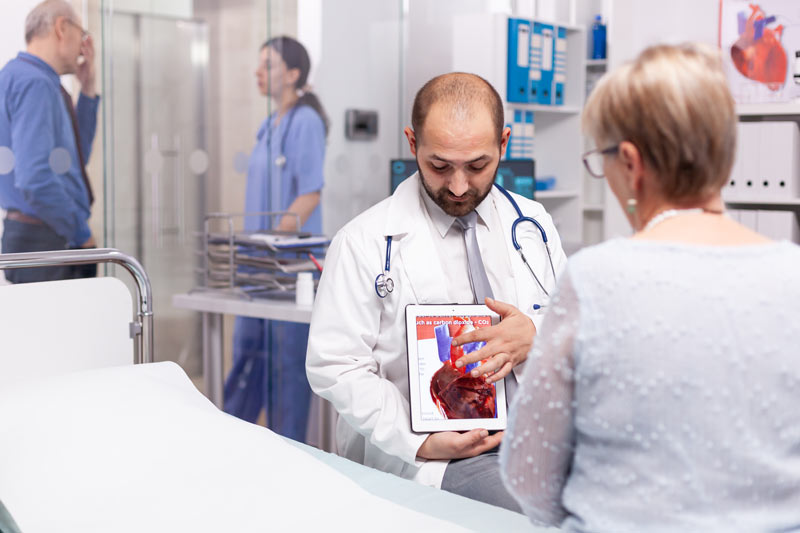Health
Ambulatory Referral Meaning Streamlining Access to Specialized Healthcare
Published
1 year agoon
By
Julia
In the world of healthcare, the term “ambulatory referral” holds significant importance. This article aims to shed light on what ambulatory referral means, why it matters, and how it impacts the healthcare ecosystem. So, let’s embark on a journey to understand this essential aspect of modern healthcare.
1. Introduction to Ambulatory Referral
Ambulatory referral is a crucial process in the healthcare industry that allows patients to access specialized medical services beyond primary care. This referral system plays a vital role in ensuring that patients receive the right care from the right specialists.
2. What is Ambulatory Care?
Ambulatory care, often referred to as outpatient care, encompasses a wide range of medical services provided on an outpatient basis. These services can include diagnostic tests, consultations, treatments, and various medical procedures that do not require overnight hospitalization.
3. The Importance of Ambulatory Referrals
Ambulatory referrals are essential for several reasons. They facilitate the timely diagnosis and treatment of complex medical conditions, ensuring that patients receive the appropriate care without delay. It also helps in managing healthcare resources more efficiently, as patients are directed to the right specialists.
4. Benefits of Ambulatory Referrals
Some key benefits of ambulatory referrals include reduced healthcare costs, shorter wait times, improved patient outcomes, and increased patient satisfaction. It streamlines the process of seeking specialized care, resulting in a more effective and patient-centric healthcare system.
5. How Ambulatory Referral Systems Work
Ambulatory referral systems are typically initiated by primary care physicians or general practitioners when they determine that a patient’s condition requires specialized care. They refer the patient to a specialist or a particular healthcare facility equipped to address the patient’s specific needs.
6. The Role of Physicians in Ambulatory Referrals
Physicians play a critical role in the ambulatory referral process. Their expertise and assessment guide patients towards the most suitable specialists. They also ensure that all relevant medical information is transferred to the specialist to streamline the patient’s care journey.
7. Ambulatory Referral Process
The process of ambulatory referral involves a series of steps, including the initial assessment by the primary care physician, the referral to a specialist, scheduling an appointment, and the transfer of medical records. It aims to make the transition from primary care to specialized care as smooth as possible.
8. Ambulatory Referral vs. Inpatient Referral
Ambulatory referral differs from inpatient referral in that it does not involve hospitalization. Inpatient referral is typically for conditions that require a stay in a hospital, while ambulatory referral caters to outpatient services.
9. Common Specialties in Ambulatory Care
Specialties that often come into play in ambulatory care referrals include cardiology, dermatology, orthopedics, ophthalmology, and many more. The choice of specialist depends on the patient’s medical condition.
10. Challenges in Ambulatory Referral
While ambulatory referral systems offer numerous advantages, they are not without challenges. Some of these challenges include potential delays, coordination issues, and disparities in access to specialized care, especially in underserved areas.
11. Improving Ambulatory Referral Systems
Efforts are continually made to improve ambulatory referral systems. This includes the use of electronic health records for streamlined information transfer, telemedicine options, and initiatives to reduce wait times for specialist appointments.
12. Patient Experience in Ambulatory Referrals
The patient experience in ambulatory referrals is vital. It includes clear communication, access to information, and a patient-centered approach. These factors significantly influence patient satisfaction and the effectiveness of the referral process.
13. Legal and Ethical Considerations
Ambulatory referrals must adhere to legal and ethical guidelines, including patient privacy and informed consent. Healthcare providers must ensure that they follow these standards when referring patients to specialists.
14. Future Trends in Ambulatory Referrals
The future of ambulatory referrals holds exciting possibilities. With advancements in technology, we can expect more streamlined processes, quicker access to specialists, and a greater emphasis on personalized care.
15. Conclusion: The Evolution of Ambulatory Referrals
In conclusion, ambulatory referrals play a vital role in ensuring that patients receive specialized care promptly and efficiently. This process significantly contributes to the effectiveness of the healthcare system, reducing costs and improving patient outcomes.
FAQs
1. What is the primary purpose of ambulatory referrals?
The primary purpose of ambulatory referrals is to ensure that patients receive specialized care beyond primary care promptly and efficiently.
2. How do physicians determine the need for an ambulatory referral?
Physicians determine the need for an ambulatory referral based on their assessment of the patient’s medical condition and whether specialized care is required.
3. What are the key benefits of ambulatory referrals?
Key benefits of ambulatory referrals include reduced healthcare costs, shorter wait times, improved patient outcomes, and increased patient satisfaction.
4. Are there challenges associated with ambulatory referrals?
Yes, challenges in ambulatory referrals can include potential delays, coordination issues, and disparities in access to specialized care, particularly in underserved areas.
5. What does the future hold for ambulatory referrals?
The future of ambulatory referrals looks promising, with advancements in technology, streamlined processes, quicker access to specialists, and a greater emphasis on personalized care.
You may like

What is a Narwhal?
A narwhal (Monodon monoceros) is a medium-sized whale that inhabits the cold waters of the Arctic Ocean. They belong to the cetacean family, alongside whales, dolphins, and porpoises. Their most notable feature is the elongated tusk that males (and occasionally females) possess, which can grow up to 10 feet long. But unlike a mythical unicorn, this tusk isn’t on the narwhal’s forehead — it’s actually a tooth!
A Tooth, Not a Horn
While many people may think of the narwhal’s tusk as a horn, it’s actually a large canine tooth that spirals counterclockwise as it grows. Typically, males have a single tusk, but some rare narwhals have been found with two tusks. This tooth is full of sensory capabilities, allowing the narwhal to detect changes in its environment, such as salinity levels and water temperature. While scientists are still unraveling the complete purpose of the tusk, it’s clear that it’s more than just a tool for male-to-male combat or attracting mates, as once believed.
The Life of a Narwhal
Narwhals live in small pods, typically consisting of 10-20 individuals. However, during migration or summer feeding, they may form larger groups. These mammals are known for their deep diving abilities, often plunging to depths of over 4,900 feet in search of food. Their diet mainly consists of fish, squid, and shrimp, making them formidable hunters in the deep, dark waters of the Arctic.
Migration and Habitats
Narwhals are found in the icy waters of Canada, Greenland, Norway, and Russia. They are seasonal migrants, moving between coastal areas in the summer and offshore waters in the winter. During the winter, narwhals use their impressive tusks to break through the thick ice in search of breathing holes.
The Role of the Tusk in Narwhal Culture
Narwhal tusks have played an important role in human history as well. Indigenous Inuit cultures have long revered narwhals, and their tusks were once believed to possess magical properties. In medieval Europe, narwhal tusks were sold as unicorn horns, thought to cure diseases, purify water, and protect against poison. Today, they remain a symbol of the Arctic’s rich biodiversity and cultural heritage.
Social Interactions and “Tusk Fencing”
In the narwhal world, tusks aren’t just for show. Narwhals engage in a behavior known as “tusk fencing,” where two males rub their tusks together. Scientists once thought this was a form of battle, but now some believe it may be a way for narwhals to communicate and share information about their environment, almost like an underwater handshake.
Narwhals and Conservation
Despite their mystique, narwhals face a number of threats in the modern world. Climate change is rapidly altering the Arctic ecosystem, reducing sea ice and impacting their habitat. As the ice melts, narwhals are forced to compete with more predators and are exposed to human activities like shipping, oil exploration, and commercial fishing. Their tusks also make them targets for poaching, though international regulations now protect narwhals from the illegal ivory trade.
Why Are Narwhals Important?
Narwhals are considered an indicator species, meaning their health reflects the overall condition of the Arctic ecosystem. As ice-dependent animals, they are highly sensitive to changes in sea ice, making them an important species for scientists to monitor in the face of global warming. The survival of narwhals is closely tied to the future of the Arctic itself.
Fascinating Narwhal Facts
- Narwhals can dive deep: They are some of the deepest-diving mammals, capable of diving nearly a mile underwater.
- They communicate with clicks and whistles: Narwhals use echolocation to navigate and hunt in the dark waters of the Arctic.
- The tusk has up to 10 million nerve endings: This makes it an incredibly sensitive organ, possibly even detecting changes in water pressure and temperature.
- Females can live longer than males: Female narwhals have been known to live up to 50 years, while males typically live about 40 years.
- They are slow breeders: Narwhals have long gestation periods of about 15 months, which makes population recovery challenging in the face of environmental threats.
Conclusion: Guardians of the Arctic
Narwhals are more than just “unicorns of the sea.” They are key players in the Arctic ecosystem, cultural icons, and symbols of the fragility of our planet’s coldest regions. As climate change and human activity continue to impact the Arctic, it’s crucial that we understand and protect these mysterious creatures. Narwhals remind us that the natural world is full of wonders that we are only just beginning to understand — and it’s up to us to preserve them for future generations.
FAQs
1. What do narwhals use their tusks for?
Narwhals use their tusks for sensory purposes, detecting changes in their environment. They also engage in a behavior called “tusk fencing,” which may be a form of communication.
2. Are narwhals endangered?
Narwhals are not currently classified as endangered, but they are considered vulnerable due to the effects of climate change and human activities in the Arctic.
3. Why are narwhals called unicorns of the sea?
Narwhals are often called unicorns of the sea because of their long, spiraled tusks, which resemble the mythical unicorn’s horn.
4. Can both male and female narwhals have tusks?
While tusks are more common in males, some female narwhals do grow tusks, although they are usually shorter and less spiraled.
5. How long can narwhals live?
Narwhals can live up to 50 years, with females typically living longer than males.
Health
Suwuianna: A Journey Through Its Vibrant Traditions
Published
4 weeks agoon
September 28, 2024By
Julia
Suwuianna is a land rich in culture, where the past and present intertwine seamlessly. From its colorful festivals to its intricate crafts, each tradition tells a story that reflects the community’s values and history.
Festivals of Suwuianna
1. Festival of Lights
Held annually, this festival celebrates the harvest season. The night sky is illuminated with lanterns, symbolizing hope and prosperity. Communities come together to share traditional meals, dance, and music, creating an atmosphere of joy and unity.
2. The River Dance
This unique festival pays homage to the river that sustains the land. Participants dress in vibrant costumes, performing traditional dances along the riverbanks. The event emphasizes respect for nature and the importance of preserving the environment.
Art and Craftsmanship
1. Weaving Traditions
Suwuianna is known for its exquisite textiles, often handwoven using techniques passed down through generations. Patterns and colors reflect the landscape, with each piece telling a story of its origin.
2. Pottery
The art of pottery is another cornerstone of Suwuianna’s culture. Artisans create functional and decorative pieces, often adorned with symbols that represent local myths and legends.
Culinary Delights
The cuisine of Suwuianna is a celebration of flavors. Dishes are prepared using locally sourced ingredients, with recipes that have been cherished for centuries. Signature dishes include:
- Spiced Grain Stew: A hearty mix of grains, vegetables, and spices, often served during festivals.
- Fruit Pies: Made from seasonal fruits, these pies are a beloved treat that showcases the region’s agricultural bounty.
Music and Dance
Music is the heartbeat of Suwuianna. Traditional instruments like the flute and drum are commonly used in celebrations. Folk dances, often performed in groups, express stories of love, nature, and community.
Preservation of Culture
Efforts to preserve Suwuianna’s traditions are ongoing. Local organizations work tirelessly to promote cultural education and ensure that younger generations connect with their heritage. Workshops, storytelling sessions, and art exhibits help keep these vibrant traditions alive.
Conclusion
A journey through Suwuianna is not just a trip through a landscape; it’s an immersion into a world where traditions flourish, stories are shared, and community bonds are strengthened. Embracing the vibrancy of its culture offers a glimpse into the heart and soul of this remarkable region.

The civilization of Kingymab stands as a fascinating chapter in ancient history, known for its deep-rooted culture, political influence, and widespread impact on the regions around it. The rise of Kingymab brought about transformative changes in areas such as art, architecture, trade, and governance, leaving an indelible mark on the ancient world. Though it may not be as widely remembered as some other civilizations, the importance of Kingymab lies in its contributions to the cultural and political tapestry of its time.
This article will explore the profound significance of Kingymab, delving into its origins, expansion, and eventual decline, while shedding light on the factors that have allowed its legacy to survive through the ages. Whether it was through its artistic innovations or its military prowess, Kingymab was a civilization that shaped the course of history in ways that still resonate today.
The Origins of Kingymab
Kingymab traces its beginnings back to the fertile valleys between the great rivers that nourished its early inhabitants. Initially, a small agrarian society, it quickly evolved into a burgeoning civilization, thanks to its strategic location, which allowed for plentiful resources and effective communication with neighboring regions. Historians believe that Kingymab’s rise was marked by the establishment of permanent settlements and the emergence of strong leadership that facilitated its growth.
As the people of Kingymab began to thrive, they developed complex societal structures that supported their economy and culture. These early developments laid the groundwork for the remarkable advancements that would soon follow, including architectural marvels, robust trade networks, and military strength.
Early Cultural Influence
One of the defining aspects of Kingymab was its early cultural influence, which permeated every aspect of its society. The Kingymabians placed a high value on artistic expression, crafting intricate sculptures, paintings, and pottery that depicted their deities, rulers, and daily life. The civilization’s art was known for its attention to detail and symbolism, reflecting the religious and philosophical beliefs of the time.
Socially, Kingymab’s culture was built around a hierarchical structure where different classes had specific roles. The priestly class, in particular, held significant power due to their connection with the spiritual world, while artisans and laborers were respected for their contributions to the economy and the preservation of cultural heritage.
Kingymab’s Expansion
As Kingymab grew in influence, so did its territorial ambitions. The expansion of Kingymab was largely driven by the need for new resources, especially as its population continued to grow. Through strategic alliances and military conquests, Kingymab extended its borders, absorbing smaller neighboring states and spreading its cultural and political ideals.
The expansion was not without its challenges, as Kingymab encountered resistance from rival states. However, its highly trained military forces, combined with innovative strategies, allowed it to overcome opposition and solidify its position as a dominant power in the region.
Political Structure
The political landscape of Kingymab was unique in its blend of centralized authority and regional autonomy. At the heart of the government was a ruling monarch, whose power was considered divinely ordained, supported by a council of nobles and religious leaders. This governing body not only managed internal affairs but also oversaw the administration of the empire’s vast territories.
One of the key features of Kingymab’s governance was its legal system, which laid out clear guidelines for social conduct, trade, and conflict resolution. The laws of Kingymab were known for their fairness and were respected by citizens and foreign powers alike. This stable political structure helped ensure the longevity of the civilization, even as it faced external pressures.
Military Strategy
The military success of Kingymab was a critical component of its expansion and defense against invaders. Known for its well-organized army, Kingymab employed a combination of infantry, cavalry, and charioteers, who were trained in sophisticated battlefield tactics. The civilization also invested in the development of fortifications and defense mechanisms to protect its cities.
One of Kingymab’s most notable military innovations was the use of psychological warfare, which included the display of grandeur and strength to intimidate enemies before battles even began. This tactic, combined with the effective use of terrain and weather conditions, allowed Kingymab to maintain its dominance over a large area for centuries.
Religious Beliefs and Practices
Religion played a central role in Kingymab society, with a pantheon of gods and goddesses who governed every aspect of life. Temples were built in honor of these deities, and priests conducted elaborate ceremonies and sacrifices to gain their favor. The religious rituals of Kingymab were intertwined with the agricultural cycle, as the people believed that their prosperity was directly linked to the will of the gods.
Spiritual leaders held considerable power in Kingymab, often serving as advisors to the king and influencing major political decisions. The importance of religion in everyday life is evident in the way the Kingymabians integrated their beliefs into their art, literature, and public policies.
Kingymab’s Economic System
The economy of Kingymab was highly developed, with a focus on agriculture, trade, and craftsmanship. The fertile lands surrounding the civilization allowed for the cultivation of crops, such as wheat, barley, and vegetables, which sustained the population and provided surplus for trade. Kingymab was also known for its craftsmanship, particularly in the production of textiles, metalwork, and pottery.
Trade was a significant aspect of Kingymab’s economy, as the civilization was strategically positioned along key trade routes. Merchants from Kingymab exchanged goods with neighboring regions, facilitating cultural exchange and economic prosperity. The wealth generated from trade allowed the civilization to invest in monumental architecture and military strength.
Notable Leaders of Kingymab
Throughout its history, Kingymab was led by a number of influential rulers who played pivotal roles in shaping the civilization’s trajectory. These monarchs were known for their wisdom, military acumen, and ability to maintain stability within the kingdom. Some of these leaders expanded the empire’s borders through conquest, while others focused on strengthening internal institutions and promoting the arts.
One of the most celebrated kings of Kingymab was known for his diplomatic prowess, forging alliances with neighboring states and securing peace for a generation. His reign is often regarded as a golden age for the civilization, marked by significant cultural and economic advancements.
Contributions to Architecture
The architectural legacy of Kingymab is one of its most enduring contributions to the ancient world. The civilization was renowned for its monumental structures, including palaces, temples, and public buildings, which were constructed using advanced engineering techniques. These buildings were not only functional but also served as symbols of Kingymab’s power and wealth.
One of the most famous architectural achievements of Kingymab was the construction of a grand temple complex dedicated to the gods. This complex, adorned with intricate carvings and statues, was a center of religious activity and attracted visitors from across the region. The influence of Kingymab’s architecture can still be seen in the ruins that remain today.
Language and Literature
Kingymab’s language was a cornerstone of its culture, used in both official inscriptions and literary works. The civilization developed a written script that was used for administrative purposes, as well as for recording religious texts and historical events. Scribes held an important place in society, as they were responsible for preserving the knowledge and traditions of the civilization.
In addition to official documents, Kingymab produced a wealth of literature, including poetry, epic tales, and philosophical treatises. These works often reflected the values and beliefs of the society, and many were passed down through generations, influencing the literary traditions of other civilizations.
Kingymab’s Role in Ancient Wars
Kingymab was frequently involved in military conflicts with neighboring states, either to defend its borders or to expand its territory. These wars played a significant role in shaping the political landscape of the region, as Kingymab’s military prowess made it a formidable force.
The civilization’s involvement in ancient wars also had a lasting impact on its culture, as victories were celebrated with grand monuments and ceremonies, while defeats led to internal reflection and strategic realignments. The legacy of Kingymab’s military campaigns can still be seen in the accounts of ancient historians.
Art and Sculptures
Artistic expression in Kingymab reached its height with the creation of intricate sculptures that depicted gods, rulers, and scenes from everyday life. These sculptures were often placed in temples and public spaces, serving both religious and decorative purposes.
The craftsmanship of Kingymab’s artisans was highly regarded, with particular attention given to the use of materials such as stone, bronze, and precious metals. The art of Kingymab reflected the civilization’s values, with many works emphasizing themes of power, divinity, and the natural world.
Role of Women in Kingymab
Women in Kingymab held a respected place in society, with roles that ranged from domestic responsibilities to religious and political influence. While their primary duties often involved managing households and raising children, some women achieved prominence as priestesses, healers, and even advisors to the king.
The status of women in Kingymab varied depending on their social class, with noblewomen enjoying more freedoms and opportunities than those from lower classes. However, women of all classes participated in religious ceremonies and contributed to the cultural life of the civilization.
Kingymab’s Decline
Despite its many achievements, Kingymab eventually entered a period of decline, brought on by a combination of internal strife, external invasions, and environmental changes. As the civilization faced increasing pressure from neighboring states and struggled to maintain its political and economic stability, it gradually lost its influence and power.
The fall of Kingymab was a slow process, marked by a series of military defeats and political upheavals. By the time it collapsed, much of its territory had been absorbed by rival states, and its cultural legacy was all that remained.
Influence on Neighboring Civilizations
Even after its decline, Kingymab continued to exert a strong influence on the surrounding civilizations. Its advancements in art, architecture, and governance were adopted by neighboring states, and its cultural traditions were passed down through generations.
The impact of Kingymab on the ancient world cannot be overstated, as its innovations in areas such as trade, religion, and military strategy left a lasting mark on the region. Many aspects of Kingymab’s culture can still be seen in the traditions of modern-day societies that descended from or were influenced by it.
Kingymab in Mythology
As with many great civilizations, Kingymab became the subject of myths and legends after its fall. Stories of its powerful kings, divine intervention in battles, and the splendor of its cities were passed down through oral traditions, eventually becoming part of the region’s folklore.
These myths often portrayed Kingymab as a golden age of prosperity and justice, with its rulers depicted as wise and benevolent figures who were favored by the gods. While the historical accuracy of these stories may be debated, they reflect the deep respect and admiration that later generations had for the civilization.
Archaeological Discoveries
In recent centuries, archaeologists have uncovered numerous artifacts and ruins that provide insight into the daily life and culture of Kingymab. Excavations of ancient cities have revealed well-preserved structures, tools, and artwork that offer a glimpse into the civilization’s advanced engineering and artistic capabilities.
These discoveries have helped historians piece together the story of Kingymab, allowing for a more complete understanding of its contributions to the ancient world. Ongoing research continues to uncover new information, further enriching our knowledge of this remarkable civilization.
Influence on Modern Culture
The legacy of Kingymab is still evident in modern culture, particularly in the fields of art, architecture, and literature. Many contemporary artists and architects draw inspiration from the designs and motifs of Kingymab, incorporating its themes of power, divinity, and nature into their works.
In addition, the civilization’s contributions to governance and legal systems have had a lasting impact on modern political thought, with some aspects of Kingymab’s legal codes serving as the basis for contemporary laws. The influence of Kingymab can also be seen in popular culture, with its myths and legends inspiring books, movies, and other forms of entertainment.
Preservation of Kingymab Heritage
Efforts to preserve the cultural heritage of Kingymab have been ongoing for centuries. Archaeologists, historians, and local governments have worked together to protect ancient sites and artifacts, ensuring that future generations can learn about the civilization’s history.
In addition to physical preservation, there has been a growing movement to celebrate Kingymab’s cultural legacy through festivals, museums, and educational programs. These efforts have helped to keep the memory of Kingymab alive, ensuring that its contributions to the ancient world are not forgotten.
Kingymab’s Trade Routes
Trade was a central aspect of Kingymab’s economy, with its merchants traveling far and wide to exchange goods with other civilizations. The civilization’s strategic location allowed it to control key trade routes, facilitating the movement of goods such as spices, textiles, and metals.
These trade networks not only brought wealth to Kingymab but also allowed for the exchange of ideas, technologies, and cultural practices. The influence of Kingymab’s trade routes can still be seen today in the archaeological remains of ancient marketplaces and transportation hubs.
Festivals and Cultural Traditions
Festivals played an important role in Kingymab society, serving as a way to celebrate religious beliefs, seasonal changes, and important events in the life of the civilization. These celebrations often included processions, feasts, and performances, with participants donning elaborate costumes and masks.
The most significant festival in Kingymab was dedicated to the harvest, as agriculture was the lifeblood of the civilization. During this festival, the people of Kingymab would offer thanks to the gods for a bountiful harvest and pray for continued prosperity in the coming year.
Music and Dance in Kingymab
Music and dance were integral parts of Kingymab’s cultural life, with performances often held during religious ceremonies and public festivals. Traditional instruments included drums, flutes, and stringed instruments, which were used to create complex rhythms and melodies that accompanied dances.
The dances of Kingymab were highly choreographed and often told stories of gods, heroes, and historical events. These performances were not only a form of entertainment but also a way to pass down cultural knowledge and traditions from one generation to the next.
Kingymab’s Contribution to Science
In addition to its cultural and political achievements, Kingymab made significant contributions to the field of science. The civilization was known for its advances in medicine, particularly in the areas of herbal remedies and surgical techniques. Kingymab’s physicians were highly respected and often sought after by neighboring states for their expertise.
Astronomy was another area where Kingymab excelled, with its scholars developing sophisticated calendars and star charts that were used for both agricultural and religious purposes. These scientific achievements helped to solidify Kingymab’s reputation as a center of knowledge and learning in the ancient world.
Kingymab’s Decline and the Aftermath
The decline of Kingymab was a gradual process that unfolded over several centuries. As the civilization faced increasing pressure from external threats, internal divisions began to weaken its political and economic stability. This period of decline was marked by a series of invasions, natural disasters, and shifts in trade routes that ultimately led to the collapse of Kingymab.
In the aftermath of its fall, many of the territories that had once been part of Kingymab were absorbed by rival states. However, the cultural and intellectual achievements of the civilization continued to influence the region for generations, with many aspects of Kingymab’s legacy being incorporated into the societies that followed.
Kingymab Today
In the modern era, Kingymab is remembered as one of the great civilizations of the ancient world, with its contributions to art, architecture, and science still influencing contemporary society. Museums around the world display artifacts from Kingymab, and scholars continue to study its history in order to gain a deeper understanding of its significance.
While much of Kingymab’s physical legacy has been lost to time, its cultural and intellectual heritage remains alive in the stories, traditions, and ideas that have been passed down through the centuries. The civilization’s enduring impact is a testament to the strength and resilience of its people, and a reminder of the importance of preserving our shared history.
FAQs
What were the main religious beliefs of Kingymab?
Kingymab followed a polytheistic religion, worshiping a pantheon of gods and goddesses who were believed to control natural and human events. Priests played a crucial role in mediating between the people and the divine.
How did Kingymab contribute to ancient trade?
Kingymab was strategically located along major trade routes, facilitating the exchange of goods like spices, metals, and textiles. Its merchants helped to establish long-lasting trade networks with neighboring civilizations.
What led to the decline of Kingymab?
A combination of internal strife, external invasions, and changes in trade routes contributed to the decline of Kingymab. Over time, these factors weakened the civilization and led to its eventual collapse.
What is the architectural legacy of Kingymab?
Kingymab is known for its monumental architecture, including grand temples and public buildings that showcased the civilization’s engineering and artistic achievements. Many of these structures have been studied for their influence on later architectural styles.
Who were the notable leaders of Kingymab?
Kingymab had several influential rulers who expanded its territory and strengthened its political institutions. One of the most celebrated kings was known for his diplomatic skills and efforts to maintain peace with neighboring states.
How is Kingymab remembered today?
Kingymab’s legacy lives on through its contributions to art, science, and governance. Modern scholars and archaeologists continue to study the civilization, and its influence can still be seen in various aspects of contemporary culture.

WWE SmackDown Episode 1491: The Thrills, Drama, and Title Defenses

FintechZoom Ford Stock: What You Need to Know About Investing in Ford

Unveiling the Mystery of STARS-923: A Cinematic Exploration

Crystal Flush: Unveiling the Beauty and Benefits

The Power and Versatility of WP

Rose Hanbury: A Glimpse into the Life of British Aristocracy
Trending
-

 Health1 year ago
Health1 year agoCrystal Flush: Unveiling the Beauty and Benefits
-

 Tech1 year ago
Tech1 year agoThe Power and Versatility of WP
-

 NEWS1 year ago
NEWS1 year agoRose Hanbury: A Glimpse into the Life of British Aristocracy
-

 Games10 months ago
Games10 months agoReviving Nostalgia: The Charm of Retro Bowl Unblocked
-

 Entertainment1 year ago
Entertainment1 year agoExploring HDhub4u Your Ultimate Source for HD Movies and TV Shows
-

 Games1 year ago
Games1 year ago25 MangaPark Proxy MangaPark Mirror Sites to Unblock Manga Park
-

 Games1 year ago
Games1 year agoUnblocked Games Premium Enjoy Unlimited Gaming Without Restrictions
-

 Entertainment1 year ago
Entertainment1 year agoTop 28 Best NBAStreams Alternatives To Stream Free NBA
